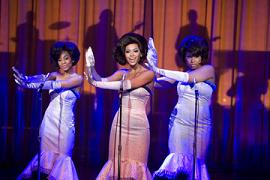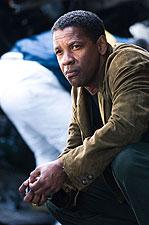 With the success of the film adaptation of the musical “Chicago,” and to a lesser degree, “Rent,” Hollywood looks to the world of Broadway one more time for a hit–this time with the Motown celebration “Dreamgirls.” Beyonce, Jamie Foxx, and “American Idol” contender Jennifer Hudson shimmy, shake, strut, and sing their way through the 1960s and ’70s career of a fictious R&B group called “The Dreams,” but your tolerance for sequins, big hair, and characters who break out into song at a moment’s notice will largely influence how much you appreciate this film’s glossy, stylized treatment of ambition and loyalty. For me, as far as musicals go, this one had just enough show-stopping moments to make it worth my time.
With the success of the film adaptation of the musical “Chicago,” and to a lesser degree, “Rent,” Hollywood looks to the world of Broadway one more time for a hit–this time with the Motown celebration “Dreamgirls.” Beyonce, Jamie Foxx, and “American Idol” contender Jennifer Hudson shimmy, shake, strut, and sing their way through the 1960s and ’70s career of a fictious R&B group called “The Dreams,” but your tolerance for sequins, big hair, and characters who break out into song at a moment’s notice will largely influence how much you appreciate this film’s glossy, stylized treatment of ambition and loyalty. For me, as far as musicals go, this one had just enough show-stopping moments to make it worth my time.
Loosely based on the history of Diana Ross & The Supremes, “Dreamgirls” tells the story of Deena, Lorrell, and Effie, childhood friends in 1960s Detroit who dream of making it big one day as a singing group. The dream begins to become reality when a car salesman turned recording artist manager, Curtis, hires them to sing back-up for a Little Richard/James Brown-style singer, Jimmie Early (Eddie Murphy). Before long, Curtis comes up with a new plan to make sleek, lovely Deena the star of the Dreams, while kicking the slightly pudgy and loud-mouthed Effie out of the group–even though she is the one with the powerhouse voice, not Deena.
The first half of “Dreamgirls” moves at a breakneck pace and feels more like a traditional movie than it does a stage musical adapted for the cameras. It is the second half of the movie–which takes place in the ’70s, when Deena becomes a huge star and Effie hits hard times–that the pace lags and the musical numbers become cheesy, inviting twitters of laughter from the audience in the theater where I saw it. And while everyone in this large cast gives a good performance, all of the actors except Eddie Murphy are dwarfed by newcomer Jennifer Hudson’s amazing, fearless performance as Effie. When she is on screen, no one else really matters.
But while it would be easy to dismiss “Dreamgirls” as nothing more than just a glitzy rags-to-riches story, there is some substance in between the singing and dancing. What the first act of the movie does especially well is establish that all of the characters realize there is more than money and fame at stake as they pursue their dreams. Mainstream success for an African-American means power in a white man’s world, especially during that turbulent civil rights era. It also means opening up previously closed doors for the generation to come after them. The question is whether or not it is absolutely necessary to abandon your own personal moral compass for the sake of the bigger cause. There’s also a few nice moments in the second act that serve as a reminder that with great privilege comes great responsibility.
Still, in true Broadway style, the movie never examines these questions in depth, but gives them only a passing touch. And unlike the real-life tragedy of the Supremes (the woman Effie is based on died young, broke, and unsuccessful), the musical chooses to wrap up all of the behind-the-scenes drama among the stars with a reasonably happy ending. Sticking to real life would have driven home some of the musical’s finer points in a much more interesting way, I think.
So, yes, “Dreamgirls” hits a few right notes and misses a few others, but in the end, it’s an entertaining look at the dreams of an entire era, and the price that comes with reaching them. And if you are an “American Idol” fan , you can just check out “Dreamgirls” to appreciate Jennifer Hudson for making a liar out of her biggest critic, Simon Cowell.


